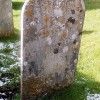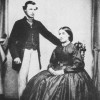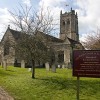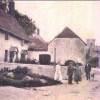“Dorset has lost a distinguished musician, one who shed lustre on the profession with which throughout his lifetime he had been associated” (Southern Times, February 11th 1938.) So ran this obituary to one of the two most distinguished musical figures to be associated with Dorset in the 19th and 20th centuries. Nor was Edgar Alfred Lane only remembered and honoured by the provincial papers, as the Daily Telegraph, Daily Express, and Yorkshire Post also paid their respects. Yet today, even in his adopted county, this composer is virtually forgotten, sharing the fate of the brilliant organist-composer he succeeded as organist of Holy Trinity Church in Dorchester – the renowned Boyton Smith.
For some twenty-seven years it was Edgar Lane who would take up where Boyton Smith had to leave off when death plucked at is sleeve but Lane was not native to Dorset. He was born into a Norfolk family in Great Yarmouth on a date usually held to be September 3rd 1865, though his birth certificate proves it was September 23rd 1864. Edgar was the eleventh of the thirteen children of Benjamin Lane and Elizabeth Kemp Lane. His grandfather was James Christmas Lane, while his great-grandfather, another Benjamin, was the captain of a schooner taken prisoner by the French during the Napoleonic wars, but later released after the British victory at Waterloo. Edgar’s eldest brother, Benjamin, had emigrated to Australia even before Edgar was born.
Edgar’s schooling was nevertheless quite elementary, though he was certainly not lacking in brains – or precocious talent. He became one of the youngest church organists ever at Holy Trinity Church, Caister-on Sea, Norfolk when just 11. At Great Yarmouth Town Hall in 1881 he conducted his first concert when only 16 (the census of that year showed he was also working as a coal merchant’s clerk.) When not yet 20 he was appointed sub-organist at Ripon Cathedral. Two years later in 1886 he took up the post of organist and choirmaster at St. Peter’s Church and Magdalen College School, Brackley, Northants, where it is noted he was a keen cricketer. It was here also that he met his future wife, Sarah Jane Clarke, a talented pianist.
Edgar and Sarah appear to have had a peculiarly long engagement, for they were still engaged in 1892 when Edgar was appointed organist and choirmaster at St. Peters in Dorchester and so subsequently began the long residence in the county where he would remain for the rest of his life. The couple eventually married in April 1893, taking up residence in a house in Cornwall Road with an excellent frontal view of the Borough Gardens, where Edgar would relax and play croquet.
Their first child, Geoffrey Edgar, was born in 1894, but about 1896 when their second son Ronald James, was born the Lanes moved to a much more spacious house at 50 High West Street where orchestras and choirs could practice. In that year too the Dorset County Chronicle reported that Lane had been appointed conductor of the Dorset Vocal Association in place of Boyton Smith. To commemorate Queen Victoria’s Diamond Jubilee in 1897, Lane composed and conducted a special piece ‘For Sixty Years our Queen’ for a concert with massed choirs held at Maumbury Rings. Respectively in 1899 and 1902 the Lane’s last two children, Margaret and Arthur Noel were born.
Those heady ‘90’s, when the older children were growing up, saw Lane emerge as a kindly child-loving family man who loved to indulge his youngsters with “rubbishy rhymes.” His philanthropy was manifest in his arranging each Sunday for Margaret and Ronald to take a fully cooked meal to a lady in reduced circumstances living in Maumbury Road. This lady, Mrs Harding, was none other than Thomas Hardy’s earliest love and the inspiration for ‘A Pair of Blue Eyes.’
In the 1901 census Lane’s occupation is given as “Professor of Music/Organist/Principal of Dorchester School of Music.” That year he formed a choral society in Weymouth and, soon after, the Madrigal & Orchestral Society, whose concerts at the corn Exchange attracted large audiences. He resigned from St. Peters as organist in 1906 to become Warden of St. Mary’s, a church that formerly stood on the site of the present Dorford Baptist. While still in this position Lane was appointed organist at Holy Trinity in 1909.
By this time Edgar Lane had become well established as a private music teacher of organ, piano, violin, cello and singing, as well as pursuing a career as a composer and conductor. Although Lane’s salary from his organ post amounted to no more than £80 per annum, magnanimously he would not charge for lessons if he considered a pupil was hard up or if his or her parents could not afford the fee.
In 1911 the Dorchester Madrigal Society, then in its eighth season, held two grand concerts on May 30th that year, which included a Coronation March in E flat Lane had written. The combined Dorchester and Weymouth Choral Societies staged a performance of “Merrie England” at the Pavilion Theatre that included Edgar’s patriotic song “For the Empire” on December 11th, 1913. When the Great War was just five months old in December 1914, afternoon and evening performances of the sacred cantata “The Daughter of Jairus” were sung in Holy Trinity Church under Lane’s direction (singing the tenor solos himself because there was a shortage of singers.) By this time the Lanes had moved to a sub-let property out at Charminster called “The Yews” and though this meant Lane having to cycle into town, it was a cheaper home to rent.
In the midst of the appalling carnage of the Somme offensive on July 12th 1916, the Dorchester Madrigal Society, in association with the King’s Own Royal Lancaster Regiment, gave two concerts at the Corn Exchange. On December 7th that year, also at the Corn Exchange, Handel’s Messiah was performed. It was during these dark war years that Lane was appointed Music Master and, when military service led to a shortage of teachers, a form master as well at Dorchester Grammar School.
Following the end of the First World War in 1919 Lane established the Weymouth Operatic Society, which was then merged with the Madrigal Society. The years 1922 to 1931 saw Lane mainly pre-occupied with training his choirs and giving singing tuition to children in various schools in the area, though there were the occasional concerts to conduct. One of these, on August 8th 1930, was a performance of Mendelsshon’s Elijah in Colliton Park. It is interesting to note that one of Edgar Lane’s singing pupils was Gertrude Bugler who, as a strikingly beautiful farmers wife in her twenties, was then an amateur actress playing Tess in the productions of ‘Tess of the D’Urbervilles’ in Dorchester.
But 1928 brought personal tragedy. With the death of Thomas Hardy in January, Lane lost a close friend and associate, for it had been through Hardy that the Lanes had acquired their first Dorchester home in Cornwall Road. Lane became involved, as had Boyton Smith before him, in writing incidental music for productions of Hardy’s stories. As the writer’s wealth had grown through publication of his works, he became more of a man of property, including the Cornwall Road house, which he rented out to Edgar Lane. Hardy was then Lane’s landlord as well as his commissioner of works! The second blow for Edgar was distinctly more personal. When grown up Geoffrey, the Lane’s first child and eldest son went to sea, first as a rating in the Royal Navy then later as a purser on a P&O liner. Though said to have never had a day’s illness in his life, Geoffrey Lane contracted pneumonia late in 1928 and died.
For one of Hardy’s last birthdays in the 1920’s, Lane arranged for the choir of Holy Trinity to give the writer a personal recital of anthems and hymns at Max Gate. Later in that decade, when the Prince of Wales (the future Edward VIII, later Duke of Windsor) visited Dorchester and Max Gate, Lane wrote a special piece for the occasion.
In 1931 Edgar formed the South Dorset Festival Choir, but had not been conducting it for long when, soon after his last festival in 1935, failing health forced him from the podium. In 1936, following two serious operations, Lane went to Sussex to convalesce. By 1937 the composer was sufficiently recovered to return to conduct one more concert in the Borough Gardens featuring a march to mark the coronation of George VI he had written while in hospital. But the remission was brief. Soon after this event Edgar Lane again fell ill and on February 10th 1938, following further operations, he died.
Throughout his very busy life Edgar Lane was not in a position to take advantage of the kudos that came from publishing light music and the few years after 1906 found his family in quite dire financial straits. More than did Boyton Smith, Lane suffered from the march of progress in technology as the advent of the home gramophone, its records and radio broadcasting impacted heavily on the popular sheet music market. Furthermore it is not known whether Lane was ever awarded an honorary degree, though he certainly spent many hours of evenings pouring over books in an exhaustive effort to work towards attaining such a qualification.
Edgar Lane’s involvement with Hardy was probably inevitable rather than accidental, since Boyton-Smith proved to be the ‘link-man’ in mutual association with both. But it is also thought that Lane had an even more intimate relationship with the great writer than had Smith, for Margaret Lane has noted that Hardy and her father “had many musical evenings together.” Furthermore, Lane, as we have seen, twice received invitations to take a choir to Max Gate, and two Hardy settings by Lane “Men Who March Away” and “Songs of Joyance” have been located. The latter was written for the Prince of Wales’ visit and the composer also set some of William Barnes’ verse to music. But few recordings and manuscripts of his music have survived: only four of Lane’s own scores have been traced, while four Barnes settings are listed in the 1932 Dorset Year Book. Lane’s daughter accounted for this paucity by noting that much of Lane’s own and commissioned work for Hardy was accidentally included among works of another composer who was destroying them on a bonfire. It is thought that further Lane scores also perished in a fire at Max Gate. However, Lane’s setting of “Fight the Good Fight” which won for the Dorset Choral Association the ‘Prize Tune Award’ of 1925 was included in the inventory taken of the items in Hardy’s study after the writer’s death.
Overall, it appears that Lane’s music was primarily written for public consumption at major ceremonial occasions reflecting the fact that orchestras, bands and choral societies he wrote for were invariably present to mark these important events.
In conclusion it could be said that anyone who, over a career of some 44 years, had held two church organist positions; a church-wardency; a music master/form mastership of a grammar school; founded and coached several choirs; taught voice and four instruments, organised and conducted several concerts and found time to compose his own and commissioned music, play cricket and croquet, keep chickens and turkeys and grow his own vegetables, could wear himself out before his time or ruin his health. Edgar Lane did ultimately ruin his health, possibly as a result of overwork, but he achieved all of the above and a few more.
Lane’s surviving manuscripts, letters, performance billings, etc, together with copies of Margaret Lane’s short biography are now kept in an archive THE EDGAR LANE COLLECTION available for inspection in the general section at the Dorset History Centre, Dorchester.



